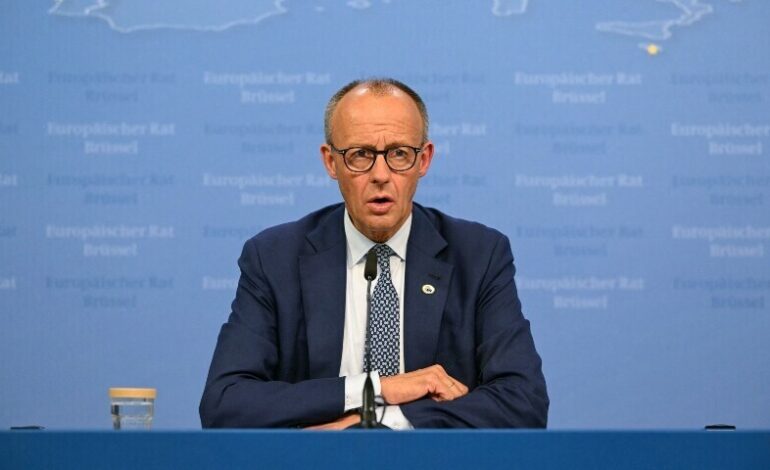
Germany Aligns with EU Migration Hardliners as Merz Attends Brussels Meeting
BRUSSELS:
In a significant policy shift, German Chancellor Friedrich Merz attended a high-level meeting of the European Union’s anti-immigration bloc in Brussels on Thursday — marking the first time a German leader has joined the group, signalling Berlin’s tougher stance on migration.
The gathering, described by Belgian Prime Minister Bart De Wever as a “pressure group,” was attended by more than a dozen EU leaders, including European Commission President Ursula von der Leyen. It was co-organised by Italy, Denmark, and The Netherlands, with the shared goal of advocating for stricter EU-wide migration policies.
“We’re delighted that Germany is on board for the first time,” said De Wever, noting the growing influence of this coalition, which seeks to limit irregular migration and increase deportations.
This alignment with right-leaning EU states underscores Chancellor Merz’s conservative government’s determination to curb irregular immigration, a key pledge during their successful campaign earlier this year. The move also reflects efforts to counter the rising popularity of the far-right Alternative for Germany (AfD), now the second-largest party in the Bundestag.
Germany Cuts Funding for Migrant Sea Rescues
In another major policy change, Germany has announced an end to funding for NGOs conducting sea rescues of migrants in the Mediterranean. According to Foreign Minister Johann Wadephul, the funds — previously amounting to approximately €2 million annually — will now be redirected to addressing root causes of migration in origin countries like Sudan, currently facing a humanitarian crisis.
“Germany is committed to humanitarian values,” said Wadephul, “but financing sea rescues is no longer the role of our foreign office. We need to act where the need is greatest.”
This marks a sharp departure from the previous center-left government’s approach, which financially supported non-governmental organisations involved in saving migrants at sea. Groups like Sea-Eye, which claims to have helped rescue over 175,000 migrants since 2015, received up to 10% of their annual budget from Berlin.
Critics argue that cutting this aid could put more lives at risk, as migrants continue to make perilous journeys across the Mediterranean. However, supporters of the new policy maintain that sea rescues may inadvertently encourage more crossings, a stance echoed in Merz’s broader push for stricter border control.
Despite declining migration figures in recent years, public anxiety over immigration remains high, with many Germans attributing socio-economic strains and political polarisation to migration-related challenges.
While experts stress that migration is primarily driven by conflict, poverty, and climate stress in source countries, Berlin’s latest moves reflect a broader trend in European policymaking — shifting from humanitarian response to prevention and deterrence.






